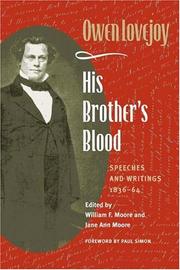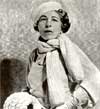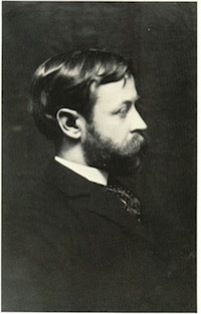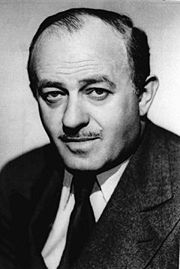
Owen Lovejoy
Born: January 6, 1811 in Albion, Maine
Died: March 25,1864 in Brooklyn, New York Pen Name: None Connection to Illinois: Lovejoy moved to Alton, Illinois in 1836. He served as pastor of the Congregational Church in Princeton, Illinois from 1838–1856. In 1854 Lovejoy was elected a member of the Illinois State Legislature. He worked with Abraham Lincoln and others to form the Republican Party in the state. In 1856, he was elected as a Republican from Illinois as Representative to the 35th United States Congress and succeeding Congresses, serving from March 4, 1857, until his death. The city of Princeton maintains and preserves his home, the Owen Lovejoy House, as a house museum. Designated a National Historic Landmark in 1997 by the National Park Service as part of the Underground Railroad, the house has a secret compartment for hiding slaves. It is open to the public to view. Biography: Lovejoy was an American lawyer, Congregational minister, abolitionist, and Republican congressman from Illinois. He was also a 'conductor' on the Underground Railroad. After his brother Elijah Lovejoy was murdered in November 1837 by pro-slavery forces, Owen became the leader of abolitionists in Illinois.
Awards:
Owen Lovejoy on WorldCat : http://www.worldcat.org/search?q=owen+lovejoy
Selected Titles
 |
His brother's blood : ISBN: 0252029194 OCLC: 53324855 University of Illinois Press, Urbana : ©2004. "His Brother's Blood is a story about ending slavery in America told in the words of one of the most eloquent and influential leaders of the antislavery movement - Owen Lovejoy (1811-64)." "In 1837, Lovejoy knelt before the dead body of his brother Elijah, an antislavery newspaper publisher killed by an angry proslavery mob in Alton, Illinois. It was then that he vowed never to forsake the cause that was now sprinkled with his brother's blood. Instead of seeking revenge on the murderers, Lovejoy dedicated himself to work with others to eradicate the system of racial slavery." "In 1839, Lovejoy became a Congregational minister, serving in Princeton, Illinois, until 1856. He was elected to the U.S. House of Representatives that same year and became a powerful antislavery voice in the 37th Congress. Lovejoy faced prosecution several times for using his Princeton home to harbor slaves on their way north, and in 1852 he invited Frederick Douglass to Princeton, to promote opposition to the Fugitive Slave Act of 1850." "Lovejoy also helped to organize the Liberty Party, the Free Soil Party, the Free Democratic Party, and the Republican Party, blending religion with pragmatism in a new way, different from that of the Eastern abolitionists." "He was elected to the Illinois House of Representatives in 1854 and supported Lincoln in his bid for U.S. senator. In the summer of 1856 when Lovejoy was nominated for Congress, Lincoln was at first upset, but within a month realized Lovejoy's political strength and supported him indirectly." "In Congress, Lovejoy served as a bridge between the Radical Republicans and Lincoln. Lovejoy said of Lincoln, "If he does not drive as fast as I would, he is on the same road, and it is a question of time." Lincoln said of Lovejoy, "It would scarcely wrong any other to say, he was my most generous friend."". |




